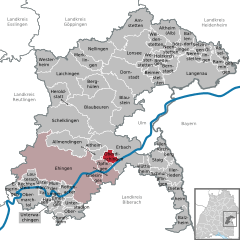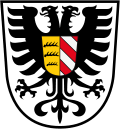Oberdischingen
| Oberdischingen | ||
|---|---|---|
| ||
 Oberdischingen | ||
Location of Oberdischingen within Alb-Donau-Kreis district 
 | ||
| Coordinates: 48°18′9″N 9°49′44″E / 48.30250°N 9.82889°ECoordinates: 48°18′9″N 9°49′44″E / 48.30250°N 9.82889°E | ||
| Country | Germany | |
| State | Baden-Württemberg | |
| Admin. region | Tübingen | |
| District | Alb-Donau-Kreis | |
| Government | ||
| • Mayor | Benno Droste | |
| Area | ||
| • Total | 8.84 km2 (3.41 sq mi) | |
| Population (2015-12-31)[1] | ||
| • Total | 2,048 | |
| • Density | 230/km2 (600/sq mi) | |
| Time zone | CET/CEST (UTC+1/+2) | |
| Postal codes | 89610 | |
| Dialling codes | 07305 | |
| Vehicle registration | UL | |
| Website | www.oberdischingen.de | |
'Oberdischingen' is a municipality in Alb-Donau-Kreis in Baden-Württemberg.
Geography
Geographical location
Oberdischingen is located on the Danube between Ehingen (9 km) and Ulm (18 km).
Neighbouring communities
The municipality is bordering to the north by to the district Niederhofen of Allmendingen, to the east and south to the city of Erbach and to the west to Öpfingen.
History
Oberdischingen was first mentioned in documents in 1148. The as Malefizschenk known Franz Ludwig Schenk von Castell (1736-1821) built here his prison. Most famous inmate of the prison was the Vagantin and crook Elisabetha Gaßner, which was executed here on January 17, 1788. In 1806 Oberdischingen - like the entire area - came to Württemberg.
Religions
Since 1275 Oberdischingen has its own parish. Oberdischingen is predominantly Catholic.
Politics
Mayors
- 1930 years: Josef Schlick
- 1948-1952: Erich Klumpp
- 1952-1956: Vincent Ströbele
- 1956-1983: Alois Speiser
- 1983-1997: Hans chisels
- 1997-2014: Benno Droste
- Since 2014: Friedrich Nägele
Traffic
Oberdischingen is connected by the Bundesstraße 311 to the national road network.
Educational institutions
Oberdischingen has a primary, and Werkrealschule.
Leisure and sports facilities
In Oberdischingen there are two football fields and four tennis courts.
Things
Oberdischingen is located on the Upper Swabian Baroque Route. The exceptional historic center is well worth seeing: Houses in French baroque Mansard - style were built by Franz Ludwig Count Schenk von Castell (1736-1821).

